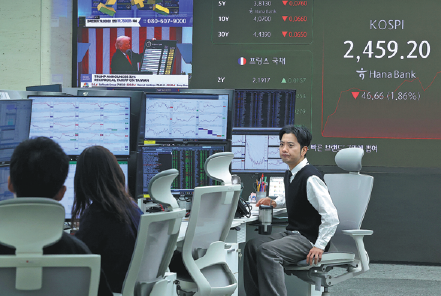Tariffs dampen investor sentiment





Investor sentiment worsened after US President Donald Trump announced that the United States would implement "reciprocal tariffs "on imports from multiple countries, sparking concerns over a potential economic downturn for not only the US but other economies too.
Government leaders of Japan, the Republic of Korea and Australia have called for responsive measures while analysts noticed negative signals in the markets.
Japanese stocks plunged on Thursday as Trump pressed ahead with higher-than-expected tariffs. The benchmark Nikkei 225 briefly tumbled over 1,600 points from the previous day, hitting 34,102 — the lowest level since early August — during trading hours on the Tokyo Stock Exchange. By the close, the Nikkei 225 marked a 2.8 percent decline.
On Wednesday, Trump announced that the US would implement a 10 percent baseline tariff across the board, with additional tariffs imposed on nearly 60 countries and regions at differing rates. Trading partners like Japan, South Korea and India will face tariffs of 24 percent, 26 percent, and 27 percent respectively.
Japanese Prime Minister Shigeru Ishiba met with key officials on Thursday to assess the economic impact of the reciprocal tariffs and formulate Japan's response.
Hidetoshi Tashiro, chief economist with the Japanese consultancy Infinity LLC, said the additional tariffs on Japanese imports appear arbitrary, with no clear justification.
"The arbitrary imposition of tariffs raises concerns that similar arbitrary regulations could be applied to foreign companies operating within the US. As a result, many foreign firms are hesitant to make direct investments in the country," said Tashiro.
"In the coming years, Japan and China must protect East Asia from the tsunami of Trump tariffs by strongly adhering to and rapidly developing a free trade area that includes South Korea and Southeast Asia," Tashiro said.
On Thursday, South Korea's acting President Han Duck-soo ordered an "all-out" response to the US reciprocal tariffs on imports from the country.
Moon Jong-chol, a research fellow at the Korea Institute for Industrial Economics and Trade, warned that the latest US tariff measures could trigger a global recession, with South Korea, along with the US and other economies, feeling the impact for the foreseeable future.
Greater challenges
With the higher-than-expected reciprocal tariffs, South Korea faces greater trade challenges with the US than ever before, Moon said.
Australia has been hit with the Trump administration's flat 10 percent global tariff but has avoided the steeper "reciprocal tariffs" the US imposed on many of its major trading partners.
Prime Minister Anthony Albanese said the tariffs have "no basis in logic" and condemned the step as "not the act of a friend". The country's central bank also cautioned that US trade policies pose serious economic risks, disrupting markets and driving up costs for businesses.
"In the face of US tariffs, Australia has an uncomfortable choice: act with the courage of its convictions around the rule-based order or act with cowardice, kowtowing to the US," said Daryl Guppy, an international financial technical analysis expert who previously served on the national board of the Australia China Business Council.
Australia should coordinate a regional response to uphold the rules-based order and swiftly align itself with international institutions that support free trade, Guppy said.
"Australia needs to show full support for ASEAN, APEC, the RCEP trade and other regional agreements," he said.
Alexis Hooi in Sydney contributed to this story.

Today's Top News
- China to continue anti-dumping duties on EPDM imports
- Trump says war with Venezuela remains possible -- NBC News
- China urges Japan to stop challenging intl bottom line with its nuclear ambitions
- US arms sales to Taiwan a dangerous gambit: Editorial flash
- Taiwan opposition lawmakers announce plan to impeach Lai Ching-te
- Boosting consumption will be key in 2026


























